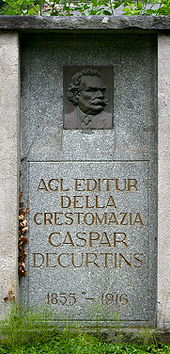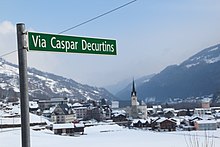Caspar Decurtins
Caspar Decurtins (born November 23, 1855 in Trun ; † May 30, 1916 ibid) was a politician ( Catholic Conservative ) from Surselva in the Swiss canton of Graubünden .
Life
Caspar Decurtins was the son of the doctor and governor Luregn Christian Decurtins and Margreta Caterina Decurtins, nee. de Latour. After attending schools in Disentis and Chur studied Decurtins after 1875 history, art history and constitutional law in Munich and Heidelberg , where he in 1876 to Dr. phil. received his doctorate. Then he studied for a semester in Strasbourg .
In 1877 he returned to Graubünden and got involved in politics. In May 1877 Caspar Decurtins was elected to the Cumin (Landsgemeinde) of the Cadi in Disentis to the Mistral (Landammann) (1877-1883) and to the Grand Council of the Canton (1877-1904). After the parliamentary elections in 1881 , Decurtins represented the Catholic Conservative Party in the National Council until 1905 .
As Landammann of the Cadi, Decurtins carried out the restoration of the Disentis Monastery after 1877 together with Placi Condrau . He eliminated the political competition of the Catholic liberals in the Surselva and became the driving force behind the Lavina naira . In the 1890s, his electoral base in the canton increasingly melted and Decurtins withdrew from politics disappointed.
In 1889, Decurtins played a decisive role in the founding of the University of Freiburg by his college friend Georges Python . From 1905 to 1913 he taught as a professor of cultural history at the philosophy faculty there.
In 1891 he advised Pope Leo XIII. in the preparation of the encyclical Rerum Novarum . The encyclical was directed against economic liberalism and socialism. In the modernism controversy , he turned with all severity against cultural Catholicism , as advocated by Carl Muth .
In the Graubünden teaching material dispute at the turn of the century , Decurtins was the driving force behind the resistance against the Graubünden government.
As a co-founder of the “Romania” language association and editor of the “Rhaeto-Romanic Chrestomathie ”, a 13-volume Rhaeto-Romanic literature and fairy tale collection, he strongly advocated his culture and language.
Decurtins had a “Christian sentiment” written for school with the young Father Maurus Carnot from Disentis . The result was the German story “Sigisbert im Rätischen Tal”, which retells the founding of the Disentis Monastery and replaced the previously prescribed textbook “Robinson”, which Decurtins thought was “too shallow”. In 1899 the Rhaeto-Romanic version “Sigisbert en Rezia” appeared.
literature
- Caspar Decurtins: Letters to a Young Friend . In: Monthly magazine for Christian social reform 1909, 689 ff
- Karl Fry: Kaspar Decurtins. The Lion of Truns , 1855–1916. 2 volumes. Zurich 1949/1952.
- Karl Fry: Decurtins, Kaspar. In: New German Biography (NDB). Volume 3, Duncker & Humblot, Berlin 1957, ISBN 3-428-00184-2 , p. 550 ( digitized version ).
- Bündner Kalender 2003, pp. 89–93
Web links
- Adolf Collenberg: Decurtins, Casper. In: Historical Lexicon of Switzerland .
- Digital Romansh Chrestomathy
Individual evidence
- ^ Markus Rohner: Christian Social Movement. In: Historical Lexicon of Switzerland .
- ↑ Review notes on The Three Winds: Rhaeto-Romanic fairy tales from the Surselva at perlentaucher.de
| personal data | |
|---|---|
| SURNAME | Decurtins, Caspar |
| BRIEF DESCRIPTION | Swiss politician and editor |
| DATE OF BIRTH | November 23, 1855 |
| PLACE OF BIRTH | Trun |
| DATE OF DEATH | May 30, 1916 |
| Place of death | Trun |



